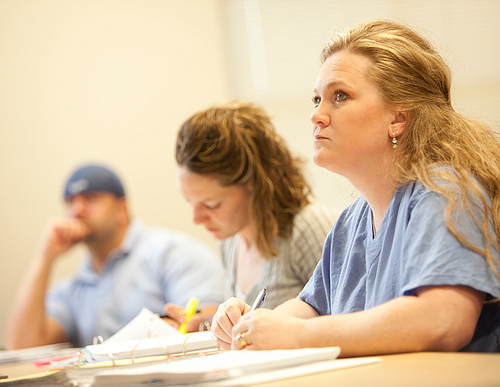
Once upon a time, the majority of American college students were too young to request a credit card in their own name. But, hey, that was a long time ago—back in the pre-Internet days of higher education. Today, the National Center for Education Statistics (NCES) reports that the vast majority of higher ed students—73 percent, in fact—fit under the non-traditional college student umbrella. Non-traditional students have changed the face of higher education. The rise of this new college majority is driving innovation online and on residential campuses. Life experience degrees, corporate universities and prior learning assessment (PLA) all have roots in the market demand for a new type of college—one that is built for and responsive to the adult learner. Below are my favorite sites for statistics, research and news about this emerging college majority. Want to get educated about the demands of non-traditional college students, both on campus and online? Visit these sites.
Best Research and News Sites for Statistics on Non-Traditional College Students
1. The EvoLLLution
The EvoLLLution—a non-traditional education newspaper—is free, web-based learning at its best. The site’s laudable goal is: “illuminating the lifelong learning movement.” Published in Canada, this grassroots higher education site is an amazing compendium of ideas and innovations for reaching and retaining the non-traditional, adult learner. Higher education leaders and innovators upload new articles daily on trends in continuing education, accreditation, accountability, online learning, mobile learning, social media and student recruitment and retention. Subscribe for free to get a weekly dose of higher education innovation in your inbox.
2. American Council on Education (ACE)
Since the 1970s, ACE has been the go-to organization for any college or corporation seeking to have their non-collegiate courses evaluated for degree credit. ACE also oversees a system whereby military training and occupational levels can be transcripted for college degree credit. Among ACE’s great recent resources is the January 2013 white paper “Post-traditional Learners and the Transformation of Postsecondary Education: A Manifesto for College Leaders.” This paper looks at workers (ages 25 to 64) and argues that colleges need to create a more accessible and cost-effective way to reach working adults. The paper’s author contends that colleges need to create more courses and credentials that evolve around competencies rather than credits or instructional seat time. MOOCs are among the recommended structures for future course delivery to post-traditional learners.
3. Adult College Completion Network
The Adult College Completion Network is facilitated by the Western Interstate Commission for Higher Education (WICHE) with support from the Lumina Foundation. The site provides first-rate research that addresses the reasons adult college students drop out of school. Also provided: best practice frameworks for how colleges can adopt policies, procedures and degree structures that bolster retention and strengthen the relationship between college courses and work competencies.
4. Council for Adult and Experiential Learning (CAEL)
Experiential learning is a very ’70s term—and indeed CAEL has deep roots that go back almost that far in higher ed history. CAEL’s mission has been to research, test and implement models for how colleges can document and transcript both work and experiential learning for degree credit. They publish research papers and hold events that teach corporate HR and academics how to develop and administer programs that link learning to work and vice versa. A CAEL published must-read for educators and policy wonks working on developing a better campus for older students is “Employer Views on the Value of Prior Learning Assessment (PLA).” The paper encourages employers to expand tuition assistance to cover not only formal courses, but also their employees’ efforts to document and transcript job competencies and real-life achievements for degree credit.
5. Lumina Foundation
The Lumina Foundation is shoveling record money into projects that increase the enrollment and retention of adult learners. The foundation funds research projects that target how to re-make higher education into a more adult-friendly enterprise. You’ll find a treasure trove of links here, including engaging policy reports like “2.1 Million Adults in Florida Went to College But Didn’t Finish” and trustworthy guides to Open Educational Resources (OER) for non-traditional college students.
6. Western Intestate Commission for Higher Education (WICHE)
WICHE rocks and it’s one of the best research websites for education. This agency is one of the original public policy think tanks dedicated to solid research and solution papers for serving non-traditional students. One of WICHE’s best papers is the policy sheet, “Non-Traditional No More: Policy Solutions for Adult Learners: Implementing a Statewide Concierge Model.” The paper recommends that statewide higher education systems implement a “concierge” to help shepherd adult students through the academic system and gain credit and recognition for prior learning, career competencies and workplace learning. The paper looks at all the barriers adults face when they return to college, from registration to financial aid, and develops a blueprint to help ensure that non-traditional college students stay engaged once enrolled.
About the Author: Vicky Phillips was cited in 2009 by US News & World Report as “for 20 years the leading consumer advocate for online college students.” In 1989 she designed America’s first online counseling center for distance learners on AOL. In 1998 she authored the first print guide to online graduate degrees – Best Distance Learning Graduate Schools put out by the Princeton Review. In 2001 she authored Never Too Late to Learn the Adult Student’s Guide to College.
Image Credit: Newman University/Flickr
